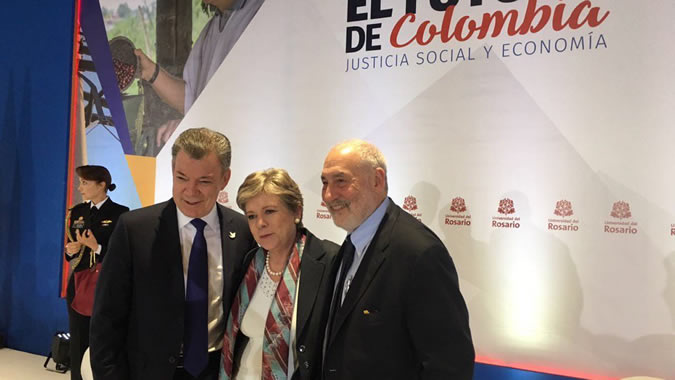Alicia Bárcena: Peace in Colombia Offers a Historic Opportunity for Moving Toward Sustainable Development
ECLAC’S Executive Secretary participated in a conference in Bogota, along with President Juan Manuel Santos, economist Joseph Stiglitz and other notable speakers.

Alicia Bárcena, Executive Secretary of the Economic Commission for Latin America and the Caribbean (ECLAC), indicated today at a conference in Bogota—where other speakers included President Juan Manuel Santos and economist Joseph Stiglitz, winners of the Noble Prizes for Peace and Economics, respectively—that peace in Colombia should serve as a transformative force to achieve profound structural changes that lay the foundation for sustainable development.
Alicia Bárcena gave a presentation during the 2017 inaugural academic conference at Del Rosario University on “The Future of Colombia: Social Justice and Economy,” organized jointly with El Tiempo newspaper and held in the Bogota Chamber of Commerce. At the event, Joseph Stiglitz spoke about the challenges and opportunities for Colombia and sustained a discussion with Juan Manuel Santos afterwards.
“You should all be proud of the peace process. With all its imperfections, it is the most profound one of the 21st century,” said Bárcena, calling for the empowerment of youth, who represent 27% of the country’s population, to build peace and embrace the 2030 Agenda for Sustainable Development as an instrument for achieving it, given that many of its goals are present in both the 2014-2018 National Development Plan, as well as in the accord with the Revolutionary Armed Forces of Colombia (FARC).
Upon analysis of Colombia’s economic performance, the Executive Secretary explained that, according to ECLAC’s estimates, in 2016 Gross Domestic Product (GDP) increased by 2.0%, driven by consumption and the arrival of remittances, which counteracted the decline in export values (-13.0% compared to 2015), mainly due to oil. For 2017, meanwhile, ECLAC foresees a 2.7% expansion—higher than estimates by the Government and other international institutions. “We are betting on the peace process,” she underscored.
Previously, between 2010 and 2015, the country experienced average annual growth of 4.5%—above the average for Latin America (2.9%)—highlighting its resilience in the face of the fall in commodities prices recorded for that period, the Executive Secretary stressed. That growth was sustained in large part thanks to steady investment rates, especially in infrastructure.
Alicia Bárcena also emphasized that direct taxation, which fosters equality if it is progressive, has already attained 50% of total revenues, and indicated that the tax reform carried out in the country also sets an example for the region. In macroeconomic matters, there are nevertheless other persistent challenges in terms of inflation (5.75% at the end of 2016), current account deficits (-4.5% of GDP in 2016), fiscal imbalance (-0.4% of GDP in 2016) and unemployment (9.8% in 2015), she remarked.
In light of this, “Colombia has taken great strides to formalize employment and in the reduction of poverty, which fell from 49.7% in 2002 to 27.8% in 2015,” Bárcena said. Meanwhile, although inequality has fallen, it is still high with a Gini index of 0.52 in 2015. On the environmental front, ECLAC’s top representative also pointed out that Colombia is the only country in the region with over 50% of its surface area covered by natural forests.
According the UN senior official’s explanation, Colombia has great potential to go beyond an extraction-focused production model, move toward sustainable use of its natural resources (particularly in mining), close urban-rural gaps and make a big environmental push with investments in new technologies and innovations that will allow it to consolidate low-carbon development and create quality jobs.
On the domestic front, Alicia Bárcena called for overcoming social fragmentation and polarization to achieve the successful social and labor reintegration of ex-combatants, for strengthening institutional capacities and prioritizing industrial policies. Externally, she called for bolstering regional integration and global governance in light of the new hemispheric context and global uncertainties.
Also participating in the opening of this conference were Del Rosario University Rector, José Manuel Restrepo; the Director of El Tiempo newspaper, Roberto Pombo; and the United Nations Resident Coordinator and Resident Representative for the UN Development Program (UNDP) in Colombia, Martín Santiago.
There was also another debate segment attended by Mauricio Cárdenas, Colombia’s Minister of Finance; Bruce Mac Master, President of the National Business Association of Colombia (ANDI); Miguel Cortés, CEO of Grupo Bolívar; Guillermo Perry, former Minister of Finance; and Mónica de Greiff, Executive President of the Bogota Chamber of Commerce.
Related content
Academic Inaugural Conference 2017: The Future of Colombia, Social Justice and Economics
Remarks by Alicia Bárcena, Executive Secretary of ECLAC (opening and closure, in Spanish).
Country(ies)
- Colombia